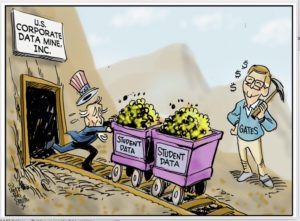Executive Summary of Rebuttal to House “Myths & Facts” on FEPA
House Majority Staff has issued a two-page response[1] to various points made in opposition[2] to the Foundations for Evidence-Based Policymaking Act, or FEPA (HR 4174),[3] which the House passed last week by voice vote without significant hearings or debate. Here is a point-by-point rebuttal of Majority Staff’s claims. This page is an executive summary of that rebuttal.[4]
Claim: FEPA doesn’t create a centralized data repository.
Rebuttal: FEPA moves toward the recommendation of the Commission on Evidence-Based Policymaking (Commission) to create a “National Secure Data Service” by 1) requiring each agency to create an evidence-building plan; 2) requiring the OMB Director to unify those plans across the entire federal government; 3) creating a “federal data catalog” and a “national data inventory”; and 4) requiring various councils to recommend how to vastly increase data linking and sharing among federal agencies, with states, and with public and private research entities.
Claim: FEPA doesn’t authorize any new data collection or data analysis.
Rebuttal: Regardless of whether FEPA expressly authorizes new data collection, it 1) incentivizes agency heads to expand, not maintain or minimize, data collection; 2) creates new sources of data for agencies by allowing unfettered access to other agencies’ data; 3) creates a process whereby public and private organizations can access non-public government data; 4) allows the OMB Director to expand the universe of statistical agencies and units; and 5) allows one person, the OMB director, to decide via post-enactment “guidance” what if any data will be exempt from sharing as too private or confidential.
Claim: FEPA “does not overturn an existing student unit record ban, which prohibits the establishment of a database with data on all students,” so parents need not worry about their children’s personally identifiable information (PII).
Rebuttal: FEPA doesn’t overturn this ban – that will almost certainly come later. But its extensive data-linking and data-sharing mandates create a de facto national database, whereby the data stays “housed” within the collecting agency but can be accessed by all. Title III specifically authorizes data “accessed” by federal agencies to be shared. This will threaten the security of not only the student data already maintained by the U.S. Department of Education (USED), but also the data in the states’ longitudinal data systems.
Claim: FEPA doesn’t repeal CIPSEA but rather strengthens it.
Rebuttal: FEPA strengthens nothing. It merely reiterates the same penalties (fine and jail term) in existence since 2002 that have rarely or never been enforced. Worse, FEPA increases threats to privacy and data security by mandating increased access to confidential data and metadata and encouraging unlimited data-swapping with no provisions for data security.
Claim: FEPA “does not respond to the Commission’s recommendations to repeal any ban on the collection or consolidation of data.”
Rebuttal: FEPA directs agency heads to identify and report “any statutory or other restrictions to accessing relevant data . . . ” Because the entire thrust of the bill is to use more and more data for “evidence-building,” the inevitable next step will be to implement the Commission’s recommendation of repealing these pesky statutory obstacles to acquiring “relevant” data.
Claim: FEPA will make better use of existing data.
Rebuttal: The federal government has reams of data showing the uselessness or harm of existing programs. When the government continues to fund those programs despite this data (see Head Start and manifestly ineffective programs under ESEA), there’s no reason – none – to assume it will change its behavior with even more data. And FEPA doesn’t even mention what is considered the gold standard of evaluation – the random-assignment model that would develop more unbiased data to provide better evidence. The bill thus initiates an Orwellian data structure for no apparent purpose.
[1] https://drive.google.com/open?id=0B7epgdVXe0gKamNsTHhFN0RMX1FRSVVwSTh0QkdsLTVyTFRF
[2] http://missourieducationwatchdog.com/congress-suspending-the-rules-to-rush-through-bill-for-national-citizen-data-system-hr4174/ & https://americanprinciplesproject.org/wp-content/uploads/CEP-one-pager-final-Nov-10.pdf
[3] http://tinyurl.com/ycxf68dh
[4] See full rebuttal at: http://bit.ly/2jo6icn
Education Week Does Balanced Story on Personalized Learning – Interviews Dr. Effrem
Kudos to Benjamin Herold and Education Week for bringing some balance to whole issue of computer-based education in the article The Case(s) Against Personalized Learning. After interviewing leading opponents from across the ideological spectrum, including Dr. Effrem, Herold lists the three main arguments against personalized learning (PL), also called competency-based education (CBE):
- “The Hype Outweighs the Research,” quoting John F. Pane, senior scientist at the Rand Corporation, who said, “The evidence base is very weak at this point.”
- “Personalized Learning is Bad for Teachers and Students” quoting progressive education author Alfie Kohn who said of personalized learning, “It’s behaviorism on a screen.”
- “Big Tech + Big Data = Big Problems,” quoting Audrey Waters who said, “When Facebook promises personalization, it’s really about massive data collection.”
Here is the quote by Dr. Effrem included in the article:
“We’re sacrificing our children’s privacy, and we’re allowing corporations to make potentially life-changing decisions about our kids, all for technology that doesn’t actually help them,” said Effrem, the president of Education Liberty Watch, an advocacy organization that supports parents’ right to control their children’s education.
As an adjunct to the article Herold developed a survey containing responses of the people interviewed for the article with their views of PL in response to the statements: “Personalized learning should ________” and “Personalized learning should not ___________”. Here are a few examples:
Let us hope this example of balanced journalism is not an isolated incident on this very important topic of personalized learning. The public and especially our children and teachers really need to understand the ill effects of PL on academic achievement, the student-teacher relationship, and data and psychological privacy.
The National Pulse – House Leaders Ignore Citizen Concerns, Pass National Database Bill
More analysis at the National Post from Dr. Effrem about the very ill-advised passage of the Foundations for Evidence-Based Policymaking Act (FEPA – HR 4174). This bill will eventually lead to the establishment of a national database. An executive summary to the rebuttal to the House Majority Staff “Myths and Facts” sheet is included. Keep calling your U.S. Senators at 202-224-3121 to stop the senate version S 2046 and the White House to veto the bill should it pass the Senate. Thank you! Read the full article here.
Excerpt:
This bill’s supporters also claim it will increase transparency. However, the only transparency it increases is to the private data of the American people, which even if anonymous, was collected in identifiable form. FEPA expands the swamp by increasing government control and monitoring of individual American citizens, and it must be stopped.
FEPA Update & Rebuttal
Thank you very much for all of your efforts to try to stop HR 4174, the Foundations for Evidence-Based Policymaking Act. Sadly the House listened to the Big Data special interests and dismissed the concerns of the grassroots, passing the bill on a voice vote with only 23 minutes of cheerleading “debate.”
In their attempt to quash debate and citizen opposition, the House staff put out a propaganda piece masquerading as “facts.” ELW along with several other groups focused on privacy thoroughly reviewed and researched these claims and have produced a response that includes a one page executive summary.
Please review the summary and let your Senators know that they should oppose this bill. The bill is on a fast track and may well bypass the Senate Homeland Security and Governmental Affairs Committee to which it is currently referred. Please also start urging President Trump to be on the lookout for this bill and to veto it if it reaches his desk.
Mr. Trump expressed grave concern over student privacy as indicated in this discussion with Ann Marie Banfield of Cornerstone Action of New Hampshire on the campaign trail in 2015. Please remind him of his statements.
More information will soon be forthcoming. This is not a data transparency bill, it is a swamp expanding bill. It must be stopped!
Issues
- Assessments + Testing (25)
- Bullying/Sex Education (6)
- Child Protection League (2)
- Common Core Standards (78)
- Curriculum + Standards (65)
- Data Collection and Data Privacy (64)
- Early Education/Nanny State (75)
- Federal Education (128)
- International Education (6)
- LGBT Issues in Education (9)
- Media Appearances (4)
- PL/CBE (2)
- Planned Economy (11)
- Politics of Education (26)
- School Violence (9)
- Social Emotional Learning/Mental Health (52)
- State Education (89)
- Testimony/Presentations (17)
- Uncategorized (13)
- Unions (10)
Education Liberty Watch Projects
ELW Allies
- American Principles Project
- Cato Institute
- Conservative Teachers of America
- Constitutional Coalition
- Eagle Forum
- Minnesota Advocates and Champions for Children
- Missouri Education Watchdog
- Restore Oklahoma Parent Empowerment
- Stop Common Core
- The Pioneer Institute
- Truth in American Education
- What is Common Core – Education Without Representation









